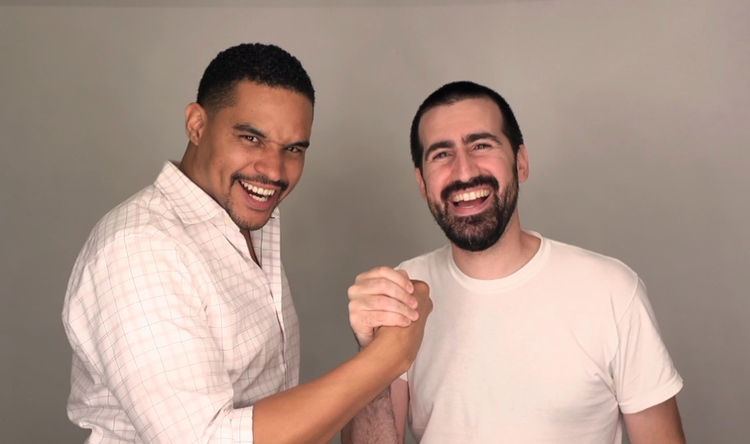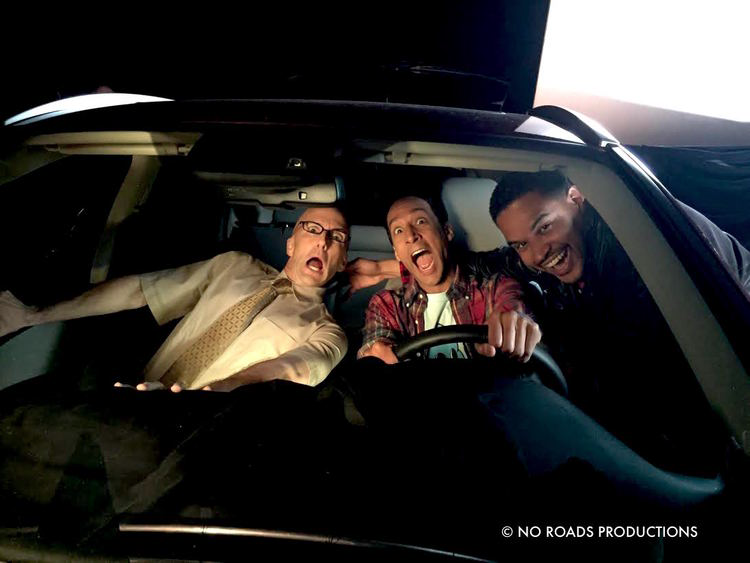Does humor sell, if it’s well done? Definitely. There are brands who push the limits, create outrageous spokespeople, and achieve enormous success: Old Spice, Geico, Sling’s new ad with Danny Trejo in a crop-top. And does this win over new audiences? We know it does. But is it easy? Not whatsoever. It’s elusive, and harder to pull off than it seems.
Except for a select few…
Some creators just have an instinct for comedy. And after years of hard work, some have the connections as well. In this profile, No Roads Productions, the team that creates socially savvy short-form content for FeigCo, Apatow Productions and other Hollywood heavyweights is here to share their expertise on the high-stakes adventure of creating hilarious content that sells. You’ve probably seen their work for brands like Honda, in partnership with the cast of ‘Community.’
Now, No Roads co-founders Greg Cohen and Jason Cox share their methodology for capturing new customers through humor.
When a potential brand client comes to you, based on seeing previous work you’ve output plus personalities you’ve worked with, what are some questions you ask to determine whether the No Roads style of humor will suit the brand… or whether there will be creative differences?
First, we would work closely with the brand to understand their mission, target audiences, overall marketing strategy, and campaign goals. By better understanding the brand, who they are, and the impact they want to have with their audience, we can tailor a content plan that fits their voice and will resonate with the intended customers or users.
Second, since comedy can be subjective, we will share samples and tonal references to garner specific feedback from the client. In some cases, we work with a client to assess potential customer feedback via surveys and user research.
Lastly, we strive to understanding our client in the context of the market, researching the competition, and how comedy — and specifically what kind of comedy — has resonated in this market.
Sometimes the easiest way to get relevance is to newsjack, or piggyback on the conversation/cause du jour. What are some guidelines for a company that’s considering doing that? Some questions they should ask internally?
The most critical aspect of “being topical” is whether or not it’s authentic for the brand to participate in a particular conversation. Key questions would include: How does this topic fit our brand? Is it relevant to the brand’s mission or purpose? Is this conversation worth being a part of? Which side of the conversation (if any) does the company want to take? And what can we contribute?
The current political and cultural climate is incredibly divided and fraught. We have seen brands make missteps recently that have been spotlighted by the media, and there is a natural inclination to want to avoid that kind of backlash. It is key to match boldness with sensitivity.
Whether it’s a tweet, a viral video, or commercial, knowing when the right time to jump into a hot topic or stay on the sidelines can be critical from a PR and brand perspective. By choosing too sensitive a topic, a company might engender controversy, which would affect the brand negatively and outweigh any potential gains.

How far do we go with the joke? Erring on the side of caution is a habit amongst the majority of brands. How do you lead a new, conservative client to where the joke needs to go?
A joke needs to be fully developed to have the best chance at landing well, but there is such a thing as taking a joke too far. To find this balance, you need to know your audience. Humor should flow from a brand’s authentic voice. In some of the cases you mentioned, that brand voice is heightened or surreal. The Geico commercials are in the world of the unimaginable, not grounded in reality. This allows the possibility of pushing the humor and getting away with more. Old Spice achieves a similar tone by utilizing a strong, recognizable character who embodies the brand’s aspirational ideal.
For more conservative brands, it’s important to develop a concept that’s true to who they are and relatable for their core consumers. If a joke goes so far that it doesn’t resonate with your audience, it will be perceived as trying too hard.
What do you think brands are nervous about that they don’t need to be?
One thing brands may be too nervous about is being offensive. While it is important to be sensitive to certain aspects of storytelling in brand marketing, it’s also important to be original and push the story in a new direction that can lead to healthy conversations and debates.
Being bold with marketing campaigns and materials in order to lead the conversation in an industry is a great way to stand out. But that boldness needs to be authentic to the brand’s voice, who they are as a product or service, and the audience they are in conversation with. Brands shouldn’t be nervous about expressing themselves, but should be cautious about getting loud only for volume’s sake without a clear purpose in mind.
Hiring famous funny faces — what’s the process? Is it worthwhile?
Although using a familiar face could come with a high price tag, it is almost always worthwhile and will expand the reach and improve the marketability of a brand. An alternative approach is to leverage emerging talent — tomorrow’s stars, whom we have connections to as well. This could also add more cache to a brand for spotting fresh talent that will resonate with their audience.
Celebrity outreach can take several forms. One option is to approach talent directly with a specific concept in mind. Does someone at your company know the celebrity personally, or have close ties to them that would be useful (and still professional) to assist in hiring them? Another is to reach out to the celebrity’s reps.
Another smart way is to work with a production company that has working relationships with celebrities, as we do, and can outreach on behalf of the brand or project. Having worked in film and television for many years, we have relationships with celebrities where we would feel comfortable reaching out to them directly, provided the brand partnership makes sense.

If a company does go the route of hiring a celebrity, what are things they should know at the time of outreach/negotiations to help craft the best partnership for their brand?
It is important that lines of communication be as open as possible, to prevent any surprises or unnecessary confusion about expectations from both parties. With our comedy experience, No Roads understands comic talent and how best to approach a conversation around partnerships that will make sense for all sides.
We also understand that time is limited with a celebrity, so capturing as many options as possible on the day is vital, while achieving that in a fun organic way. During production, the company should ensure that the celebrity feels comfortable and understands what is expected of them, so that that there are no loose ends on the day of the shoot.
Revising and releasing digital pieces to support a larger release… Tell us what this process looks like from your side, for a brand that is not a major studio.
This is an exciting strategy, as pieces or a series of short clips can be both incredibly funny on their own, and successfully tease and build up to a main event, building momentum and amplifying audience reach. We have extensive experience editing multiple pieces of content as part of an overall campaign, and enjoy developing a roll-out strategy that organizes content in the most awareness-building, engaging, and appealing ways possible.
Content strategy and distribution is a key factor in the success of branded content campaigns. Strategies include engaging content partners (sites, blogs, high profile social accounts) and media channels (YouTube, Hulu, etc.) with organic and paid promotion to augment targeting on web, email, and through social media. For a brand that is not a major studio, social media is key.
What kinds of products/services should absolutely not try to be funny in their marketing?
People can find the humor in the darkest of situations, so we do not believe there should be a definite “absolutely not” sticker on certain products/services when it comes to comedy. It depends on how the marketing is being seen, who will see it, and when. There are certain circumstances and specific times (“too soon”) when it is not appropriate to be funny, and in those cases there is no need to force it.
What kinds of products/services should probably try to be funny in their marketing, even though it’s possibly never been attempted before?
Male/female hygiene products, health products, bathroom supplies, home decor/design, kitchen/laundry supplies. Humor is about connection, about breaking the ice, and about creating a shared experience. There’s no one-size-fits-all recommendation, but a laugh can go a long way when it comes to making brands come to life. Most consumers have loads of everyday experiences in common, and we believe that finding the joy and humor in those daily realities of life can help to forge a connection with a brand and serve as a unifying tool for communities as a whole.



